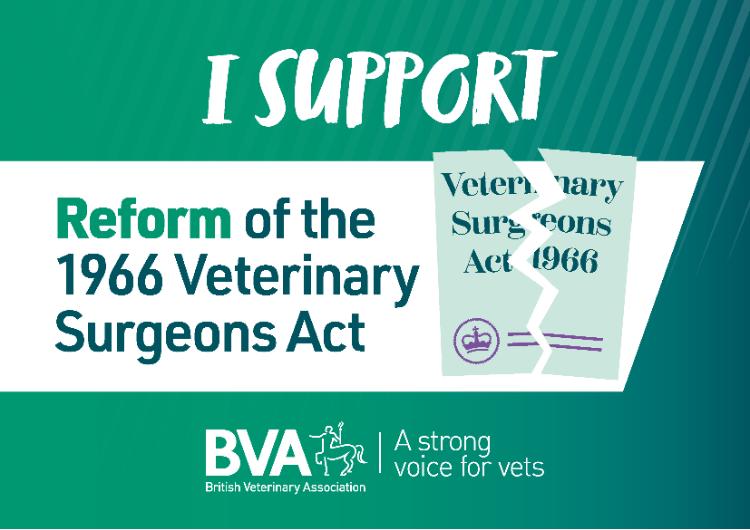#BVAManifesto – a manifesto for animals, vets and public health
Ahead of the next General Election, the British Veterinary Association (BVA) has launched a manifesto for animals, vets and public health. BVA is calling on all political parties to prioritise the following key issues within their election manifestos:
Animal Welfare Legislation
Following the demise of the Kept Animals Bill in May 2023, and the subsequent loss of the measures contained within it – which would have prevented the suffering of thousands of animals – it has been positive to see the recent introduction to Parliament of the Animal Welfare (Livestock Exports) Bill, the Animal Welfare (Import of Dogs, Cats and Ferrets) Bill and the Pet Abduction Bill.
However, with the latter two pieces of legislation being Private Members Bills, which are by no means guaranteed to become law, and with the current Parliamentary session building up to a General Election, meaning that it could well be cut short, BVA would like to see a commitment from all parties in their election manifestos to deliver the necessary legislation to protect animal health and welfare.
Specifically, with the emerging threat of diseases such as Brucella canis entering the UK from overseas, we want to see stricter pet import measures, including mandatory pre-import testing, to minimise the spread of disease. We also want to see a ban on the importation of dogs, cats or ferrets with mutilations which are illegal in the UK, such as cropped ears.
In addition, as vets see first-hand the terrible damage done when dogs are not kept under control around livestock – especially during lambing season, we want to see the replacement of the Dogs (Protection of Livestock) 1953 Act with legislation that contains clearer definitions of livestock-worrying and which expands police powers.
Overhaul of the Dangerous Dogs Act
Following several tragic incidents of dog aggression towards people, the Government recently announced a ban on XL Bully type dogs. While we understand the reasoning behind the Government’s decision and agree that public safety must be paramount, we do not believe that banning individual breeds is effective. Despite there being Breed Specific Legislation in place for over 30 years, the number of people bitten or attacked by dogs continues to increase year on year.
To protect the public properly, the law should not focus on types of dogs, but instead deal with aggression in all dogs. A shift from breed-specific legislation to breed-neutral legislation is needed, and we would like political parties to commit to significant reform of the Dangerous Dogs Act 1991, to produce legislation which focuses on responsible breeding and ownership, early intervention in cases where dogs are out of control and better enforcement of regulations.
Reform of the Veterinary Surgeons Act 1966
The Veterinary Surgeons Act became law in 1966 – in a completely different era – and is desperately in need of reform. Whilst vets are regulated within this Act, veterinary practices are not, there is no protection of the ‘veterinary nurse’ title, meaning that anyone can use it, and there is no recognition of the wider vet-led team.
We believe it is essential that the title ‘veterinary nurse’ should be protected, to prevent its use by unqualified, unregulated individuals and to recognise their professional status and the invaluable role they play. We want to see other allied professions brought into the regulatory framework of the Royal College of Veterinary Surgeons (RCVS), to improve further the standards of animal health and welfare, and to allow vets to focus on the functions that only they can undertake. There should also be mandatory practice regulation, to increase standards and raise public confidence.
New primary legislation which modernises the regulatory framework is urgently needed, making the Act fit for purpose. The need for legislative reform has significant cross-party support and needs to be a priority for the next Government, in the interests of animal health and welfare, the delivery of veterinary care and the retention of veterinary professionals.
 Minimum set of animal welfare standards in trade deals
Minimum set of animal welfare standards in trade deals
To protect animal health and welfare further, we would like to see all parties commit to introducing a minimum set of animal welfare standards in all trade deals. Following the recent signing of free trade agreements with Australia, New Zealand and Japan, we are seeing repeated examples of the UK opening up its markets to goods produced under low welfare systems. A minimum set of standards will therefore safeguard the country’s high animal welfare standards and prevent the UK market from being flooded with produce farmed under conditions which we would never accept.
It is vital that we safeguard the UK’s high reputation for animal health, animal welfare and food safety. In all trade agreements, the Government must only grant tariff-free access to agricultural goods where there is equivalence with core standards of animal health, animal welfare, public health and food safety and responsible antibiotic use.
Access to veterinary medicines in Northern Ireland
Northern Ireland is expected to lose access to a significant percentage of veterinary medicines at the end of 2025 due to the changes required by EU regulations. These include the only licensed salmonella vaccine for poultry, the loss of which could represent a serious public health emergency.
Vets in Northern Ireland cannot continue to work to a high standard for animal welfare - and therefore to protect human health - if a significant number of veterinary medicines are discontinued. To avoid uncertainty and additional stressors on the veterinary workforce, it is essential that a long-term solution is found.
A commitment from all political parties to safeguarding the supply of veterinary medicines to Northern Ireland beyond 2025 is therefore essential.
PoliticsHome Newsletters
Get the inside track on what MPs and Peers are talking about. Sign up to The House's morning email for the latest insight and reaction from Parliamentarians, policy-makers and organisations.
